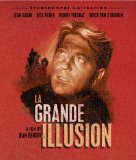| Reviews & Columns |
|
Reviews DVD TV on DVD Blu-ray 4K UHD International DVDs In Theaters Reviews by Studio Video Games Features Collector Series DVDs Easter Egg Database Interviews DVD Talk Radio Feature Articles Columns Anime Talk DVD Savant Horror DVDs The M.O.D. Squad Art House HD Talk Silent DVD
|
DVD Talk Forum |
|
|
| Resources |
|
DVD Price Search Customer Service #'s RCE Info Links |
|
Columns
|
|
|
La Grande Illusion
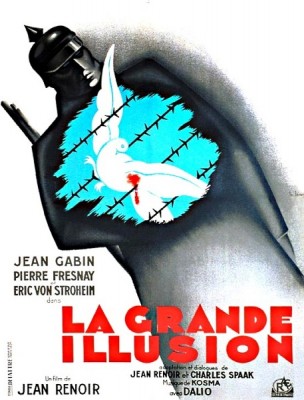
Please Note: The images used here are stills provided by StudioCanal or from the film's original promotion, and are not taken from the Blu-ray edition under review.
"Frontiers are an invention of Man; Nature doesn't give a damn." - Rosenthal, La Grande Illusion
In some strange but salient way, Jean Renoir's 1937 masterpiece, which has at its center a trio of French soldiers imprisoned by the German enemy during World War I, is actually about a little German girl left fatherless by the war. This child is a fairly minor character, without much dialogue, who only appears in part of the film's final quarter, but she represents an important culmination, both of the soldiers' journey back into the bigger world that includes women and children, and of ours toward the realization Renoir wants to inspire regarding the far-ranging and devastating effects of war. Her presence is the most prominent, indelible reiteration of the theme permeating the film, from its beginning right up to its final brilliant, profoundly moving frame: the disruption and damage done by war to what Renoir clearly sees (and, as is his trademark, sets aside plenty of screen time for celebrating, despite the dismal milieu of these particular characters) as the real, nonviolent and non-nationalistic business of human life -- work, play, camaraderie, brotherhood, friendship, family, and love. Along with Ozu and Satyajit Ray, Renoir is one of the greatest, most accomplished humanists/advocates for the preciousness of life -- by which is meant the peacefully "mundane," everyday routines, moments, and interactions we can so easily take for granted -- that the cinema has ever known. The world he shows us is always rich, warm, and potentially joyous, but it earns every bit of its goodness and light through the filmmaker's honest acknowledgments of life's bitter truths and complexities; if it sounds pretentious to say he uses the camera humanistically, the sheer engaging, entertaining, funny and sad panorama of humanity and feeling he manages to encompass with it is always immediate and affecting, never schematic or cerebral. Rather than being a handicap when it comes to conveying the profundity of a subject as serious as La Grande Illusion's, Renoir's relaxed, often exuberant, stop-and-smell-the-roses sensibility and ultimately optimistic emphasis -- his overriding tenderness, affection, and moral preference for what the soldiers in the film would probably think of as relatively trivial "civilian" matters -- makes the tragedy of his characters' unwilling but unavoidable entry into the wastefully murderous theater of war resonate all the more deeply, and their bound-to-be-disappointed hopes that civility and respect can be maintained in wartime, and that the war will be over soon (their "grand illusions"), all the more piercingly quixotic.
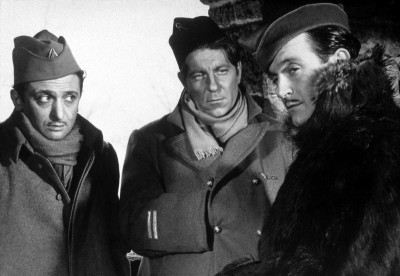
La Grande Illusion's emphasis, then, is steadily and surely on human-sized concerns, starting long before we're introduced to the orphaned girl. Nearer the opening of the film, the daily routines of life in the German prison camp and the way it brings a disparate group of men together dominate the narrative: French screen legend Jean Gabin plays his best-known (if not definitive) role here as Maréchal, a conscripted working-class railroad engineer (a peacetime occupation Gabin would take on for Renoir in the following year's La Bête humaine) serving as a pilot, who has been asked to take his aristocratic superior, Captain de Boeldieu (Pierre Fresnay, Le Corbeau), up for reconnaissance. The two are shot down by a German captain, von Rauffenstein (played by major silent-era Hollywood director/future Sunset Boulevard actor Erich von Stroheim), who treats them more or less as guests, along with their roommates, including Rosenthal (Marcel Dalio, who appeared with Gabin that same year in Pépé le Moko), the scion of a wealthy French Jewish family whose packages from back home mean the men often eat better than their captors. It's that kind of detail that Renoir emphasizes; the plot may be driven by the men's ceaseless escape attempts, which is their duty despite their relative comfort, but even when they're taking turns secretly and tediously digging tunnels underneath the camp, with all the progress and setbacks and interesting logistics and suspense built into that process, it's the revelation of their personalities, the ways they interact with one another, and what they come to mean to each other -- not whether or not they escape -- that come to the forefront. The class differences between the blue-collar Maréchal, the wealthy Rosenthal, and the titled de Boeldieu are bridged as well as they can be (not least by the captain), but they're ultimately uncrossable, perhaps more so than national or language divisions: despite his loyalty remaining steadfastly with his own men, de Boeldieu cannot relate to them (Maréchal comments more than once on his real affection for and ultimate gratitude to de Boeldieu, and his concurrent inability to express it in a way that can penetrate his good captain's aristocratic, emotion-shunning veneer) as well as he can to the also aristocratic von Rauffenstein, his opposite number on the German side, with whom he shares a common jet-setting frame of reference from before the war, and who disdains Maréchal and says the name Rosenthal sneeringly (reflecting a common-enough European sentiment that would take nasty flight in Germany later on). Meanwhile, Maréchal and Rosenthal's rapport goes from slightly antagonistic to kindred-spirited, and after they're whisked away to a castle-fortress run by von Rauffenstein just as they're about to make use of their just-completed tunnel in the first camp, it is these two who finally escape together. They're helped toward freedom by a self-sacrificing gesture from de Boeldieu that paradoxically makes him the victim of von Rauffenstein at the same time it draws the two blue-blooded men closer than ever, one of them literally dying and the other a living-dead remnant of the withered, pointless privileged-by-birth class (the one whose last petal Renoir would tenderly pluck two years later, in The Rules of the Game), bound in their mutual understanding and acceptance of a sort of end-of-the-line noblesse oblige.
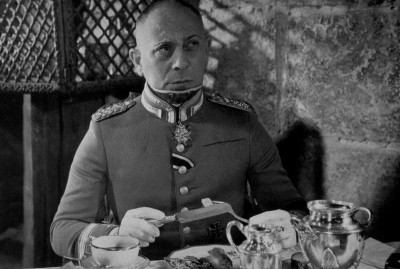
On the hard road to freedom after their escape, Maréchal and Rosenthal traverse hostile territory as they head toward Switzerland, starving, fearful, and battered; but they reach an oasis of civilian life in the form of a little farm in the country, where we come across the little German girl I mentioned at the beginning. The girl and her mother, Elsa (the ever-alluring Dita Parlo, L'Atalante), the widow of a German soldier, lead, albeit in a bereft fashion following the death of the household's father/husband, the kind of nurturing, getting-on-with-it, peaceful, and natural existence (the kind Renoir favors) from which anyone participating in the war has been separated, and which seems like heaven to the starving Maréchal and Rosenthal, who have for so long lived apart from civilized, productive routine. This section of the film, with Maréchal's and the hausfrau's budding, tentative romance despite their language barrier and the idyllic moments the four of them pass in each other's company, including a celebrating Christmas together as a de facto family, is the strongest, most whole glimpse we get of what the two men and their comrades have all been trying to achieve, however they can, throughout everything we've seen prior, whether through Rosenthal's shared feasts, solidarity among the men in their conspiracies and escape attempts, or the putting on of a ragtag revue that joins together American, English, and French prisoners in an act of creativity: some semblance of normal life with prosperity, security, and some enjoyment and happiness, not the violent engagement of some enemy, as its aim. By contrast, the artificial divisions and strivings of combat seem not only pointless but warped and cruel, a result of priorities arranged precisely backwards.
Priorities as they would be were they right-side-up, however, are reflected in La Grande Illusion's every emphasis, in story and dialogue all the way down to Renoir's structure and style themselves, all reinforcing, without apparent effort or strenuousness, what he believes should rightly be of most interest and highest concern in human affairs. Very tellingly, we witness only one moment in this "war film" of anything that could be described as combat, and that takes place not on a battlefield among anonymously clashing formations of soldiers, but in the final confrontation of de Boeldieu and von Rauffenstein, characters we've come to know in some detail as individuals; they are, horribly, torn between their real affection for each other and the actions each of them is taking out of their sworn loyalty and duty, ensuring the eventual violence between them. But Renoir offers something even more specific, graceful, and gratifying than his refusal to indulge any appetite we may have for adrenaline-pumping, exciting, dehumanizingly large-scale depictions of mayhem and destruction: Within these groups of very distinct individuals, his camera is always roaming (Renoir was one of the exemplary "long-take" directors enthused over by film theorist André Bazin; Robert Altman, he of the perpetually roving camera eye, once said, "The Rules of the Game taught me the rules of the game."), reframing from one bold, striking, and/or beautiful composition to the next, so that there is frequently a current of movement and attentiveness running between all of the people onscreen, as in the scenes of preparation for and performance of the prison-camp music-hall revue, where his camera glides fluidly from man to man, centering and valuing, if just for a moment, each one's valuable existence and capacity for desire, happiness, and suffering.
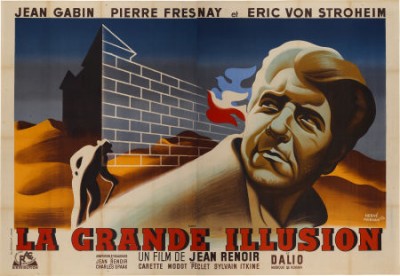
There are far too many to list here, but for just one especially memorable example of Renoir's total fluency in visual storytelling, there's the scene where Maréchal is returned from a stay in isolation and a nervous breakdown, and we cut to a smooth track in toward Rosenthal, who's preparing dinner and whose tears of gladness and relief at his friend's rejoining them we glimpse just momentarily as he turns away and the scene fades down; or there's the similar, equally well-choreographed camera motion that brings us in for a close-up on von Rauffenstein's geranium, "the only flower that grows here," which he is cutting after he has shot de Boeldieu, with the forlorn-looking, now flowerless plant saying much, without a hint of heavy-handed symbolism, about the loss of impractical, civilizing touches like flowers and friendships when otherwise perfectly compatible colleagues are pitted against each other by their respective governments. The film's final sequence, with soldiers firing at the pair of escapees but finally putting their guns down in conscientious deference to Swiss neutrality as Maréchal and Rosenthal cross the invisible border between Germany and Switzerland, is another visually eloquent, unstrained triumph: The music comes up and we conclude on the widest, most expansive shot in the movie, with the two tiny figures seen from above (as they enter from the bottom of the screen, in what from this angle is an upward movement, an ascension) onto a huge, open, snow-blanketed field. This, at least for one sweet moment as the film ends, is the ennobling freedom these two men had been denied and were seeking so desperately -- the true freedom that comes with the silencing of gunfire, the removal of the threat of violence and death, and an open space in which to move forward.
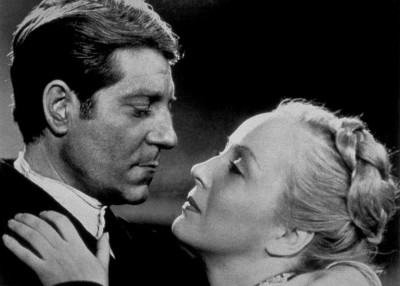
For this reviewer, though, the most hauntingly understated yet irresistibly moving touch in La Grande Illusion is the way Renoir bookends the aforementioned scenes toward the end of the film with Parlo and the small girl. When Rosenthal and Maréchal first enter Elsa's humble yet proudly kept home, after she has told them the story of losing her husband and other menfolk in her life to the war, she gestures toward the kitchen table and says, "The table has become too empty"; Renoir then follows her hand with a pan of the camera that feels spontaneous, utterly natural, to reveal the tot sitting alone at said table and looking tiny and fragile surrounded by what is, indeed, a void of too much empty household space. When, despite Maréchal and the woman's feelings for one another and the family they've formed together over their Christmas reprieve, the two men must leave before they're caught by German soldiers, Elsa reenters the cabin after seeing them off, and the camera follows her back to the same vast table, from which she resignedly clears four dishes and where from now on there will be only two place settings; there are no words, no tears, no announcement of the scene's significance, but it is devastating. Renoir has convinced us once and for all that this, a hardworking and contented life with an intact family, is the most precious thing in the world, and the inscrutable machinations of geopolitics and governmental squabbling have unjustly robbed these good people of their most basic, most positive human aspiration to strive unfettered for some happiness.
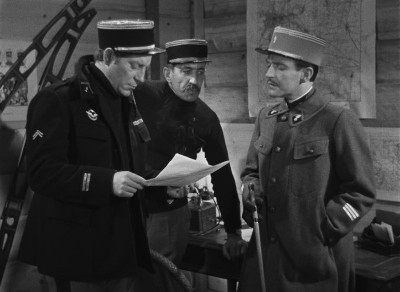
The film is, in short, wall-to-wall replete with superb visual strategies that harmonize with, enrich, and enhance its every dramatic and performative turn. Renoir doesn't just tell a story that takes the French mandate for liberty, equality, and fraternity as its bedrock principles; he enacts those principles through his use of the medium, the way in which he brings his people and their circumstances to life with an elegant simplicity that, while never showy, is always extremely artful and impressive, mysteriously retaining over multiple viewings its emotional suspense and seemingly effortless ability to involve and affect us, continuing to make fresh imprints no matter how many times we've seen the film or how familiar we've become with "what happens"; how this story happens, the way it accretes its power with so little bombast to unexpectedly leave you reeling by the end, is a mystery we're happy is never quite solved. Barriers of language, man-made divisions between nations that some are forced to kill and die for; Renoir and his band of artisans (foremost among which are cinematographer Christian Matras (who later shot Lola Montès and most of Max Ophüls's other French films), Renoir's perennial editor (and common-law wife at the time) Marguerite Renoir, and Joseph Kosma, composer of the film's score with its rousing tempos and mournful melodies) create a magnificently told story around how needless these boundaries are, how trivial if only we could see them as such. Perhaps the even greater achievement of Renoir and company, though -- the one that really makes La Grande Illusion such a perfect film -- is the dissolving of another false barrier (and one, I'm afraid, that I'm as guilty as the next film writer of indulging in from time to time for expedience): the one dividing "style" from "content." Any film enthusiast, teacher, or mentor looking to demonstrate, for neophytes, students, or other interested parties, that the style is the content need only show them La Grande Illusion, which is packed with inspired, adventurous, above-and-beyond flourishes that don't announce themselves as such, because they're also absolutely indispensable to the film's characters and action; every last complex, seamless, exactly right shot, composition, or camera movement is both a marvelously well-executed and creative deployment of techniques available only to film, and integral to the movement and meaning of Renoir's timeless, ageless, tremendously sad but unforgettably exhilarating story.
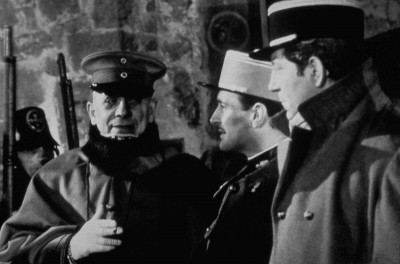
THE BLU-RAY DISC:
The transfer that's been done for this release, an AVC/MPEG4-encoded, 1080p-mastered presentation at the original theatrical aspect ratio of 1.37:1, is just superb; a three-minute restoration demonstration in the extras confirms the huge difference between the film's muted, faded look and its new form in a condition so close to brand new, you could swear you were watching newly-struck print on its inaugural projection. The demonstration reveals that nothing has been removed (especially that precious celluloid texture, so easily digital-noise-reduced away in hastier clean-ups for DVD/Blu-ray, is a more even, fine grain here than we may be used to seeing in films of this vintage, but present in every frame), but that all the black and white contrast in the picture, every nuance and shading, has been carefully brought out, literally "restored" in the careful digital process. It's a piece of important work that's been done with all the proper care one could hope for, and it deserves our appreciation and congratulations on its conscientiousness; it was clearly done by skilled technicians who also love and respect the medium and have taken very seriously their responsibility to the top-notch work of cinema in their care.
Sound:The sound has undergone the same meticulous process of restoration/revelation as the visual element, with the utmost fidelity to the original sound. This means that the disc's DTS-HD Master Audio 2.0 track presents the film's original monaural soundtrack with an unexpected richness, clarity, and depth, without introducing any false sonic anachronisms; it is has been kept mono, thankfully, and all the limitations of the audio technology of the time (a certain tinniness to the dialogue recording, a brassiness/slight overload to more lively orchestrations in the score) are left intact. It's such a fine yet historically accurate job, it seems unlikely that we'll ever hear the film any closer to the way an audience on opening night in 1937 would have heard.
Extras:*--Two theatrical trailers, one from the film's initial release in France, the other from 1958. The former is a straightforward preview not too unusual for its time and place, meaning it certainly has its charms. The latter, however, is actually not so much a trailer as one of the "introductions" Renoir took to making for his films in the '50s (familiar to most anyone who's seen practically any of them on DVD editions, which often include the appropriate introduction), and it's a lovely one, demonstrating -- through his relating of personal anecdotes and photos from his own WWI experiences as well as stills from the film as he articulates his impressions of its making and meaning -- how very close to his own being and to his own self-image as an artist, La Grande Illusion was. All these introductions made in the '50s show Renoir as a smart, supremely intelligent, reflective, yet jovial and humble older gentleman of the cinema, and this one is no exception.
--A 12-minute introduction by Ginette Vincendeau (author of Jean-Pierre Melville: An American in Paris) in which the French cinema expert gives us a crash course (remarkably extensive given its brevity) on Renoir's career generally, and in particular on La Grande Illusion: its place in Renoir's filmography; its multiple, extremely diverse and often contradictory meanings for Renoir and for critics, scholars, and audiences over the decades; and a very astute analysis of the film itself. Very enlightening.
--"Success and Controversy", a 24-minute piece with French film historian/Renoir specialist Olivier Churchod going further and deeper into the way the film has been interpreted/spun by various political and interpretive factions over the decades since its release. Churchod knows all the fine points of Renoir's own political shifts/evolutions as well as the ways in which the film has been claimed by the political right and left both, and it makes for a fascinating, informal, but well-organized and articulate mini-lecture. The best part: his eloquent refutation, based on a close reading of the film itself, of a popular '70s scholarly attempt to debunk La Grande Illusion as anti-Semitic and pro-passivity in the face of France's impending Nazi occupation during World War II.
--"La Grande Illusion's Original Negative: A Remarkable Story,", wherein Natacha Laurent, spokesperson for the Toulouse Cinémathèque, which owns the original negative of La Grande Illusion used in this restoration, runs down the remarkable story of how the negative in their vaults made its way from France to Germany to Russia and back to France again through WWII, the Cold War, and finally to today, as well as debriefing us on the principles and philosophies of film restoration as a profession, and the Toulouse Cinémathèque's humble, impassioned origins and evolution into an important institution.
--"John Truby on La Grande Illusion," in which a Hollywood script doctor recounts the film's influence on him and Renoir's masterpieces' effect on screenwriters generally.
*Of note, the U.S. version of this La Grande Illusion Blu-ray release, while of the same extremely high quality as international versions, has several notable differences from editions StudioCanal is releasing elsewhere: The packaging is much less elaborate; a 1986 TV interview with script girl Françoise Giroud in which she revisits the film's castle location; and a short film, La Petite Marchande d'Allumettes (The Little Match Girl) included on other regions' editions is not included here, as it has already been released in the U.S. by StudioCanal's stateside partner, Lionsgate, as part of The Jean Renoir Collection.
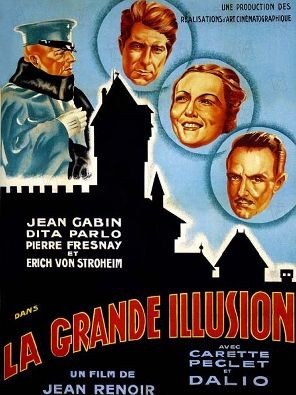
La Grande Illusion is a film that belongs right there alongside Citizen Kane and Renoir's own La Règle du jeu (The Rules of the Game) as one whose preordained-feeling classic-masterpiece status you don't hesitate for a moment, whether you're on your first viewing or your twentieth, to heartily agree with; it's a great film through and through. In recounting the seemingly simple story of a small band of relatively unscathed Frenchmen captured by the Germans during World War I, Renoir casts a very wide net and draws back the most nuanced dimensions of story and character, giving us scene after scene of sheer, unharried visual, narrative, and performative pleasure, all while nimbly, quietly, but profoundly touching on huge themes -- the realities and sobering implications of war, nationalism, and class forced to the fore by the interrelationship of the soldiers with one another and with their captors (with Renoir never losing sight of his ongoing, primary concern -- how we can stay humane and preserve one another's everyday-life dignity in a complicated and only precariously moral world). But this is no preaching polemic from a god's-eye view. Renoir never tells us how class divisions run deeper even than those between nations, or how damaging and disruptive warlike quibbling over boundaries and governmental power is to the real, true business of human life; he shows us, indulging us at the same time with all the narrative elegance and sheer cinematic exuberance (those perfect camera movements/reframings, always so gentle and proportionate to the story/characters, yet always so meaningful and beautiful!) through which he demonstrates his joy in and love of his people, whatever their flaws, weaknesses, or mistakes, whatever side they happen to find themselves on, however painfully torn they are between duty to their homelands and fealty to their brothers and sisters in the human race. Renoir's flawless, open-hearted and open-minded grace, his consummate skill behind the camera, breathe through every assured, relaxed, life-loving scene of this film, and the director's moral convictions about war's tragedy and futility emerge powerfully, without any moralizing, through nothing but his steadfast insistence on always prioritizing the human over the military and geopolitical. Certainly, there are no pacifist speeches, and every soldier does his unfortunate duty without really questioning the system. But Renoir keeps the "action" all interpersonal in one way or another, so it's always about human relationships, needs, values, even when it comes to the film's one isolated, momentously significant depiction of violence; you don't really realize, until the end, that you've seen literally no battlefields, no combat. The subtle but cumulatively overwhelming force arising from Renoir's deep compassion and magnificent cinematic prowess makes the truism about this masterpiece actually true: There is surely more than one great antiwar film (though you and I may disagree on what the criteria are and on which movies meet them), but La Grande Illusion, absolutely uncompromising and impassioned despite its leaving of war's true brutalities offscreen and its unexpected joy and generosity, is the greatest antiwar film of all. DVD Talk Collector Series.
|
| Popular Reviews |
| Sponsored Links |
|
|
| Sponsored Links |
|
|
| Release List | Reviews | Shop | Newsletter | Forum | DVD Giveaways | Blu-Ray | Advertise |
|
Copyright 2024 DVDTalk.com All Rights Reserved. Legal Info, Privacy Policy, Terms of Use,
Manage Preferences,
Your Privacy Choices | |||||||









